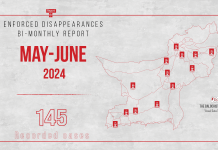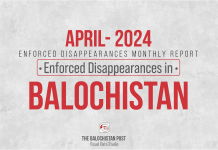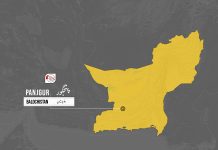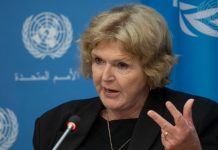For months after the historical long-march, Mama Qadeer, his compatriots and the entire Balochistan awaited the promised response. Every other day, one would fixate on the television screen, scroll through the social media or pore over the local newspapers, only to get a minutia of news on the much-anticipated response from the government. The marchers returned to Balochistan with hope, but, like always, this hope soon gave away.
The UN and the EU reneged on their promises. Balochistan never received any delegation to investigate the issue of missing persons. VBMP’s protest against the enforced disappearances continued in Quetta. Every day at 8 a.m., Mama Qadeer would arrive at the protest tent pitched outside the press club for his daily 9-hour vigil. Some days would be spent in conversation with the other protests; others in complete silence. At 5 p.m., Qadeer would collect the images, store them in the press club, and leave. Tomorrow will be better; he would tell himself. Maybe tomorrow someone will pay heed to his cries, but nothing would happen. Every day, the journalists and cameraman employed in the press club would saunter across the streets, without giving a second glance to the protest camp. Every day, the protestors would plead for justice; every day, the media would ignore. This has continued for 11 years.
A year after the hollow promises of the UN and the EU, the VBMP once again summoned the hope and filed an application in the Supreme Court of Pakistan and surprisingly, the court took action. Nasrullah Baloch, the Chairman of the organization, requested the Pakistani government to provide him protection, as he had received countless life threats at that point. During the hearing in Islamabad, Mr Baloch entreated the government to hand over the dead bodies of the missing Baloch persons, instead of disfiguring their faces with lime and dumping them into mass graves. He also regretted that there is no functioning mortuary in Balochistan to preserve the dead bodies until they are identified and claimed by their family members.
Promptly after the hearing, the Supreme Court ordered the advocate general of Balochistan to submit the report on the procedure of handing over the bodies to the families and the number of functioning mortuaries in Balochistan. The two-judge bench also instructed the then-Attorney General of Pakistan to submit a detailed report on Balochistan.
In April 2015, the Lahore University of Medical Sciences (LUMS) planned to hold an event entitled: ‘Unsilencing Balochistan.’ The aim of this seminar, according to the organizers, was to“Learn about the history, complications, human rights abuses, and the struggle for justice that has been going on in Balochistan.” The speakers included I.A Rehman, Director of HRCP, Mama Qadeer and Farzana Majeed, central figures of VBMP, Muhammad Ali Talpur, a columnist and a veteran fighter in Baloch insurgency, and few other activists. Because this event aimed to bring the plight of Balochistan into the national spotlight, the establishment intervened and resultantly, the event was cancelled. According to the university management, personnel of the intelligence agencies had personally met with the dean and instructed him to cancel the event under ‘government orders.’ LUMS apologized with the guests and cancelled the seminar.

The outraged students condemned this government intervention “a gross violation of freedom of expression, freedom of assembly, freedom of information, academic freedom and political pluralism.” Students and faculty members organized a peaceful protest in front of the university. The protestors wore black bands as an indication of lamentation against the freedom of speech. The protestors said that an academic event was imperative to highlight the situation in Balochistan and to search for a possible solution.
Following the cancellation, the adamant LUMS students smuggled Mama Qadeer and Farzana Majeed into the university campus overnight. A small seminar was organized and the speakers had talked about the variegated human rights abuses in Balochistan before 200-300 students.
The LUMS incident was an obvious hint of Pakistani states’ culpability in the human rights abuses in Balochistan. The seminar was rescheduled and relocated to The Second Floor (T2F) in Karachi by the activist Sabeen Mahmud. Under the title ‘Unsilencing Balochistan (Take 2)’, a panel discussion was successfully conducted in Karachi. The speakers – Mama Qadeer, Farzana Majeed and Muhammad Ali Talpur – highlighted the ongoing grim situation in Balochistan. Addressing enforced disappearances and kill-and-dump, Qadeer said that: “These are ways to cripple us mentally and physically so that we no longer are staunch on our cause.” He said the state has employed numerous tactics in to quell the uprising in Balochistan but it forgot that “the Baloch are a proud nation” who have “fought and survived various invaders.”
Farzana Majeed inquired the audience and the public on why questions were raised on her character when she sought national and international help for the recovery of her missing brother. “I keep asking you for help. I ask the High Court of Balochistan and the Supreme Court of Pakistan, the police and the activist groups. But can you not hear us?”

Muhammad Ali Talpur lamented that the public does not conduct transparent research on Balochistan and only rely on the government’s fabricated narrative of the Balochistan. “So, what the state labels us that how people refer to us.” The panel discussion moved to the role of an independent, unbiased media in highlighting the major issues that have plagued Balochistan and how the government can provide a wide space to media to freely work in.
When the seminar was over and Mama Qadeer and his fellow speakers were departing, Saba Mahmud, the Director of the T2F and the organizer of the event, told them to stay for few minutes so that an entourage can escort them to their residence. “Don’t go alone. Karachi is just not safe these days. Let my friends escort you back to your hotel”, she had told him. After ensuring the safe return of the speakers, Mahmud had left T2F with her mother. Minutes later, some 500 meters away from the café, she was attacked by unidentified miscreants. Sustaining four bullets throughout her body, Mahmud was transferred to a nearby hospital where she succumbed to the wounds and died, whereas her mother, who had been shot twice, survived.
Mahmud’s murder was explicitly linked to the event she organized. When informed about her death, Mama Qadeer lamented: “she was more worried about our safety then she was about her own. We lost a friend and supporter.”
After the VBMP’s historical march in 2014, Pakistani journalist and Geo News anchorperson Hamid Mir invited Mama Qadeer and Farzana Majeed on his popular talk show – Capital Talk. As the news of the invitation spread, Mir was contacted by the ISI and threatened not to air the program; he refused. Sensing the imminent threat looming above his head, Mir disclosed to his brother, Amir Mir, and his news channel, Geo news, that if anything happens to his life, the then ISI Chief Zaheer-ul-Aslam is to be held responsible.
Soon after interviewing Qadeer and Majeed, Mir was attacked by an unidentified gunman while he was travelling to his studio from the airport in Karachi. He received six bullets – in shoulder, ribs, thigh and abdomen – two of which are still lodged in his body. Following the attack, Mir’s affiliated organization, Geo, and his family blamed ISI for the attack. For hours, the news organization explained at great length the connection between Qadeer and Majeed’s interview and the attack on Mir. The organization gave a detailed account of the threats that he’d received from the country’s strongest institution. His brother came forward and ratified the claims, even Mir himself dubbed ISI – or the incumbent chief Zaheer-ul-Aslam, to be specific – culpable.
Days after the attack, the then Prime Minister of the Pakistan Nawaz Sharif visited Mir in Karachi. When inquired about the judicial inquiry on the attack, Sharif said verbatim: “Look Hamid, we want you to get well but don’t really expect us to find out who tried to kill you. Who is going to go and ask a working general? Meanwhile, here are three senior judges who will help you get over the whole thing.” The country’s prime minister was afraid to question a ‘working general’!
Geo news’ onslaught of the ISI was not welcomed by the military establishment. After a few hours of the attack, the military sent a formal request to the Pemra, Pakistan’s media watchdog, to suspend Geo news. The next day, parliamentarians and politicians slammed Geo and Hamid Mir for bringing the country’s most venerated institution to ‘disrepute.’ Geo’s vans, offices and journalists were attacked throughout the country, forcing the organization to formally apologize for its ‘mistake.’ Pemra slapped a 15-day temporary ban and a 10 million rupees penalty on Geo news.
Mahmud and Mir were the lone voices in the mainstream activism and media that questioned the human rights abuses in Balochistan and the government’s inaction in this regard – both received the comeuppance for their crimes. The VBMP expressed grief over the attacks on the advocates of the Baloch cause, but continued its protest, until January 2019. The BAP-led Balochistan government negotiated with the VBMP and promised the retrieval of the Baloch missing persons in a press conference in Quetta. Chief Minister Kamal Khan Alyani told the media that his government will exercise its power to recover the thousands of Baloch missing persons. With a bumptious countenance, the chief minister ranted criticized the previous governments for only photo-opping with the victims and not paying heed to their plight. He assured that his government is “committed to sort this problem out” within “two months.” Assured by the government’s response, the VBMP chairman announced to suspend the protest for two months.
In those days, some missing persons were indeed returning to their homes, reportedly due to the BNP-Mengal six-point agreement with the PTI-led government. But the enforced disappearances were not stopped – tens of persons were detained after the Balochistan government’s assurance. Sensing that the government has reneged from its promises, the VBMP reopened its protest within days.
Conforming to the government’s instructions, the protest was also suspended in early 2020 amid the Covid-19 pandemic. Apart from these minor bumps, the protest has continued unhindered since 2009, for 4000 days.
As if the available evidence was not enough to incriminate the Pakistani state for systemic human rights abuses in Balochistan, the Peshawar High Court, one of the country’s most powerful judicial bodies, overturned 200 convictions by the military courts a few weeks ago, citing inadequate evidence against the culprits and an unfair trial. In 2018, the aforesaid court also overturned 70 military court convictions. In its detailed ‘final judgment’, the court had provided a compendium of the military court convictions and their underlying charges. The court had provided a conspectus of the cases and had established that most of the cases of military court culprits had been registered as ‘missing persons’ from different areas of Pakistan, especially Balochistan. The report said that the would-be culprits are detained from Balochistan, confined and tortured in cells and then tried by the military courts on ‘unreliable’ evidence. This report is the final nail in the coffin of the Pakistani military culpability in the enforced disappearances in Balochistan.
During its 11-year protest, the VBMP has been promised and betrayed many times. The federal and local governments and the global organizations – EU and UN – have failed to deliver justice to the victims of Pakistan’s enforced disappearance in Balochistan. Thousands of Baloch have perished through the state’s kill-and-dump policies; manifolds more remain missing to his day. Hundreds of activists have been forced to seek asylum in foreign countries. Yet despite all these daunting setbacks, the protestors persevered and marked the history through their peaceful and consistent campaign. Under the architecture of repression, the protestors have maintained hope; hope that their loved ones will return one day.
So, after all these hardships, what did the Voice for Baloch Missing Persons’ 4000-day march achieve? Nothing! For 11 years, the campaigners maintained a peaceful protest against the “monstrosities of the Pakistan forces” in Balochistan; they sought national and international assistance, marched thousands of kilometres to the federal capital, but nothing worked. Their woes have been ignored; their anguish neglected. Every year, tens of peaceful protests are organized and social media campaigns launched, but to no avail. The family members of the missing persons appear on the roads, carrying placards and chanting slogans of justice, but return home disappointed. The authorities have turned a blind eye to Balochistan. It seems that the Pakistani state has finally considered Balochistan a lost cause – needed only for plundering; nothing more.
[Final Part]






























